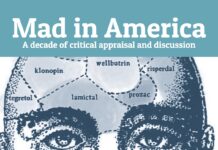At the beginning of September, I wrote about the next stage of the Mad in America Continuing Education project—the development of webinar formats—and I announced the planning for a “course” on withdrawal from psychiatric medications. At that time, I was able to provide only introductory information, but I can now provide a full picture of the seven webinars that comprise the course and update a few other developments.
First, here are some developments: For the first webinar, we applied for 1.0 CEs for psychologists, social workers, licensed professional counselors, nurses and marriage and family therapists—and got approval within 24 hours. This is not very unusual for us with past courses, but in this instance there was some uncertainty given that we took the step (as I reported in September) of beginning the series with a panel of persons who’ve “been there, done that.” From our perspective this makes total sense, but it was not a slam dunk given that the individuals who are providing the information about their experience in withdrawing and now supporting others are not licensed mental health professionals.
Fortunately, the continuing education review organization, Commonwealth Educational Seminars, recognizes that we are doing something unique—with all of our courses. Their perspective is that the key factor in whether a given session can be approved for professional learning is the expertise of the presenters in the topic they are addressing—not fancy academic credentials.
For the first webinar on October 24, we can now announce our three panelists, each of whom is more than qualified to talk about the experience of withdrawing themselves plus their ongoing work in supporting others in that same kind of process.
The first panelist is Jocelyn Pedersen of Utah who will be providing observations about going off benzodiazepines, a topic of growing interest given the dramatic increase in the prescribing of these medications. In her state, for example, it has become the most commonly abused substance, surpassing even heroin and other street drugs. And it is all in the name of treating mental health problems of anxiety and depression.
Dina Tyler of California is the second resource on the panel. Dina has long served as a peer worker and has based much of this on her experience recovering from psychiatric diagnoses and withdrawing from the neuroleptics and other drugs prescribed to her.
The third panelist will be Oryx Cohen. Oryx is also one of those individuals who has gone off psychiatric medications and done quite well in addition to assisting with the development of a guide to tapering off these drugs. Finally, I’m especially pleased that Emily Cutler has stepped forward to moderate the panel. As you may know, Emily has been working largely behind the scenes of Mad in America Continuing Education to make sure all of the technical pieces come together. She solves around 10 problems every day that I would be clueless about how to figure out.
We have been extremely pleased to see the interest generated by this first offering in the series. In fact, within three days, we had filled all 75 slots reserved for the “early bird” discount on the registration fee. I want to credit one of our advisory board members, Ron Unger, for suggesting we step up our marketing. While none of us really want to charge for our courses, we must find ways to become more self-sustaining and it’s clear that people will respond as we make these kinds of incentives available. We continue to see enrollments for the entire series of seven webinars at the regular registration fee of $100, which we know is on a competitive schedule with other education courses. As more and more people are telling us, the idea for a course on psychiatric drug withdrawal is an idea whose time has come.
Speaking of the other webinars, we can now announce the full set of dates and presenters. They begin with Dr. Sandra Steingard on November 12 discussing her journey toward a practice where research on long-term outcomes from psychiatric medications is taken seriously. She will present on the research that provides an evidence-based rationale for supporting patients to taper from antipsychotics. She will discuss some of the challenges psychiatrists face when they are open to tapering and discuss her five years of experience of using a collaborative decision model that supports public mental health clients in deciding whether to reduce their dose of neuroleptic drugs. Dr. Steingard has increasingly stepped forward in her profession to share her perspective at national and international conferences.
On December 12, psychiatrist Dr. Kelly Brogan also presents her clinical experience working with patients withdrawing from psychiatric drugs with an emphasis on the critical role of addressing the physical and emotional reasons that gave rise to psychiatric “symptoms” in the first place. She will provide a particular focus on anxiety and depression as well as the psychospiritual underpinnings of this withdrawal process. She will describe her approaches in her clinical practice and her online healing community. Dr. Brogan has created an international audience through her website and newsletter and it is an honor to have her join us in our continuing education project.
Another international figure, Swedish therapist Carina Hakansson, will speak on January 16 of her nearly three decades of experience, first as founder of the Family Homes Foundation and now as founder of The Extended Therapy Room, helping people taper from psychiatric medications. She will speak of her need to “put on a white coat” given the absence of a medical-based practice for drug withdrawal. She will tell of how residential care can be organized around a person in crisis during drug withdrawal. She will also report on the activities of the International Institute on Psychiatric Drug Withdrawal, which she founded last year to bring together international experts on this subject to develop both drug-withdrawal training and research.
One of the truly great heroes and advocates for a half century or more, Dr. Peter Breggin, has agreed to share his long perspective on the hazards of long-term use of psychiatric drugs on February 20. He will show us the compelling “evidence base” for psychiatric drug tapering protocols; drug-withdrawal syndromes that patients experience when tapering from psychiatric drugs; the biological explanations for such syndromes; and patient-centered and controlled approaches to successful drug tapering and withdrawal. Peter has courageously spoken and written about these issues for longer than virtually anyone else. I have been pleased to get to know him personally and be on his National Progressive Radio program twice and am excited that he has become increasingly visible in the Mad in America network over the past year or so.
Another key individual with great international visibility and experience is presenting on March 20—therapist Will Hall, PhD candidate and author of the Harm Reduction Guide to Coming Off Psychiatric Drugs. The guide has now been translated into 15 languages and used worldwide. He will discuss how he works with individuals, families, and clinicians using a person-centered and flexible approach to drug tapering and withdrawal as a life change and learning process. His presentation will include information on drug response diversity, crisis risk, and alternative responses to experiences seen as psychotic.
As I noted in my September blog, we are not only beginning but also ending our course with the panel of persons with lived experiences. On April 17, they will review this first MIA withdrawal course, its strengths and shortcomings, and discuss an agenda for developing drug-tapering knowledge and support programs. This agenda must take into account what we know about this subject as a society, and what we yet need to learn.
Each day, we are receiving more enrollments at the regular $100 registration fee. We are grateful for each person who is joining us. We also recognize that many people who are working with people in various stages of a tapering process as peer supporters would be extremely interested in this course, but may not always have the funds to purchase a place. We therefore set aside 25 of the initial 200 places available at no charge to those who filled out an application. (All of these scholarship slots have now been filled.)
The most common question I am getting is whether the webinars will be available online after the “live” event. Obviously, many people will not be able to participate at the schedule time. People are busy. Some people in Western Europe and Australia and New Zealand are at a major disadvantage from a time zone perspective. So the answer is that each webinar will be uploaded the next day—sometimes the loading process takes a little longer but our experience is that within two days, all of the webinars will be there. So do not hesitate to register if the time and date do not work for you.
The only glitch that has come up with making the webinars available afterwards is for CEs for social workers only. A recent change in the social work continuing education standards is that only those webinars that are taken “live” will count for CEs. This is not our change nor is it something initiated by Commonwealth Educational Seminars. But we have to live with it and make sure we provide the information so there is no misunderstanding about it later.
Stay tuned. There may be additional news forthcoming because we are already looking into a second course on medication withdrawal. The demand is there. The additional information is out there too and we have begun some planning and discussion with other international leaders on what this might look like. I also want to thank every person who has already registered for this first course and look forward to your responses to the information we will shortly be sharing on a monthly schedule.















sounds very good….I am still hoping that someday
information about mental health and illness will be free to all..
I have a problem about making money when it
involves mental health…but I have a mental illness..
Report comment
Congrats on this achievement! Really wonderful.. i pray it is the start of a wave of awareness concerning this so misinformed/misunderstood topic of treating emotional issues with drugs that actually CAUSE the very issue they r trying to prevent!
Report comment
Brilliant. “Professionals” make more money off of survivors. Long live mental health!
Report comment
You pick a psych drug poison , say Zyprexa for example . You find at least 3 people who have really been strung out on it for at least a year or more, on more than a minimal dose . If they managed to wean off and are now off that particular poison and are totally psych-drug free and are also medical drug free . If they use or used first do no harm methods like Traditional Naturopathy , Homeopathy ,included home made herbal extracts,vitamins , Energy healing methods, wilderness tripping etc. , in a safe place with one or more friends for support . Have figured a strategy for dealing with “mental health professionals and the pharma system” meanwhile to keep them off their back. We want to hear their stories in detail, related live ,with them open to questions from an audience .At least 3 such people for each drug poison , or drug poison cocktail. How they dealt with and how much recovering if any from high voltage shocks if any of them have achieved it. All these people should be the featured up front speakers.
The so called salaried “professionals” that have made some bucks , even if a minority have been on psych drugs or are still on them .And I’m not saying they can’t be of some benefit, but not to the extent of real survivors of long term hell, like myself. Instead of rethinking psychiatry so much, let them finance and open up an underground compound pharmacy where all the drug poisons can be made available as titrated liquids in various doses for those that want to wean off the poison drugs safely over time.We need available liquid titrated poison psych drugs with or without scripts, for those in need . Safe houses too ,with organic food and distilled water available , good books, music etc.
Now that’s the way to design a seminar .
Report comment
Also anyone that knows how electric shock treatments and coercive psychiatry can both be obliterated should also be featured speakers.
Report comment
I think it is reprehensible to ask people – who are scared maybe to the point of being terrified, but who know they have to come off these drugs – to pay money.. in effect, to exploit their dreadful predicament. I came off all class of psychiatric drugs including Benzo’s, hypnotics, lithium and three anti-psychotics ON MY OWN, it was without doubt the most horrific time of my life. I would never, ever ask anyone for money for my experience, what I did and how to avoid disaster. Right here, I will give you the most important information free: look up Heather Ashton on Youtube and here:
http://benzo.org.uk/index.htm
My experience was that benzo’s and anti-psychotics are the most difficult to come off…. it has to be as slow to what ever your response is. With lithium, at least in the UK you have to taper down to 200mg reducing 200mg every one to two weeks or longer depending on your response. When at 200mg, NEVER EVER cut the tablet. take 200mg every day for one week, then 200mg once every two days for one week then 200mg once every three days for one week. That is dependent on your response… it can be longer. when you get to 7 days without it, STOP. But be prepared to start again at 200mg if you are becoming manic and go through the procedure again.
Avoid foods/herbs/spices that inhibit your liver enzymes (Cytochrome P450) that include black tea, black pepper, garlic, turmeric, Valerian (found in NYTOL do not touch it or any such sleep aid with Valerian) This will help prevent you going into akathisia. It happened to me.
Psychologically you have to be prepared for insomnia and for it to go on for a long time. The best you can do is stop drinking alcohol, tea and coffee. Take magnesium citrate – because of the important function of magnesium in regulating the N-Methyl D-Aspartate receptor – ESPECIALLY if you have anxiety. Have a good mattress/bed, an eye mask for total darkness and total quiet. If the next door neighbour is making a row or has a dog barking its head off.. just move, get away from it asap. It happened to me.
If your family and any friends are willing to help that’s great but they may not. In which case look out for people like myself…. People who want nothing in return… are not selling books or courses. UK Pharmacists are good.. find one that wants to help.
Report comment
Charging a hundred bucks to disseminate information on psychiatric drug withdrawal does sound rather Capitalistic/opportunistic. The information should be in the public library where I found Dr. Peter Breggin’s book(s). He says one must cut back the drug by 10% every three months. I tell this to people for free on http://www.mentalhealthforum.net
Report comment
New intensive therapy and recovery program to get off of psychiatric drugs:
https://thumbs.dreamstime.com/z/bad-medicine-pills-being-thrown-away-to-toilet-37435691.jpg
Report comment